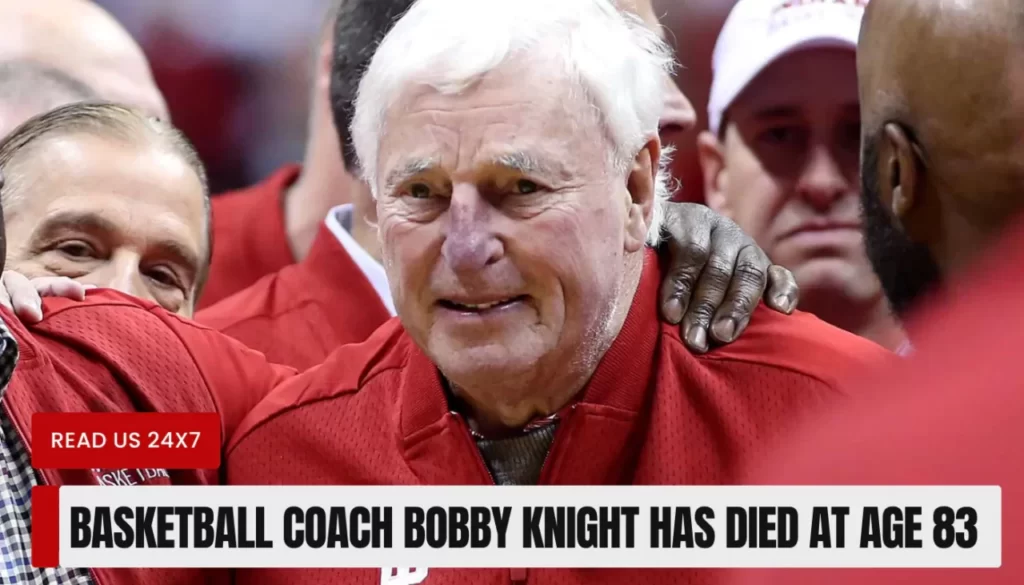Bobby Knight, one of the most legendary and controversial coaches in the history of college basketball, has died at the age of 83. His family announced his passing on Wednesday night, saying that he died at his home in Bloomington, Indiana, surrounded by his loved ones. Knight was known for his fiery temper, his intense coaching style, and his unparalleled success on the court. He won three NCAA championships, 11 Big Ten titles, and an Olympic gold medal during his 42-year coaching career. He also influenced many players and coaches who followed in his footsteps, but also faced criticism and controversy for his behavior and methods.
The Life and Legacy of Bobby Knight
- Early Years and Playing Career
Knight was born on October 25, 1940, in Massillon, Ohio. He grew up playing basketball and football, and attended Ohio State University, where he played for the Buckeyes under coach Fred Taylor. He was part of the 1960 national championship team, and also reached the NCAA title game in 1961 and 1962. He graduated with a degree in history and government in 1962.
- Coaching Career at Indiana University
After serving as an assistant coach at Army and Cuyahoga Falls High School, Knight became the head coach of Army in 1965, at the age of 24. He led the Black Knights to four postseason appearances in six seasons, and also coached the U.S. team at the 1979 Pan American Games, where he was involved in an altercation with a Puerto Rican police officer.
In 1971, Knight was hired as the head coach of Indiana University, where he would spend the next 29 years of his career. He quickly turned the Hoosiers into a powerhouse, winning his first NCAA championship in 1976 with a perfect 32-0 record. He repeated the feat in 1981 and 1987, making him one of only four coaches to win three or more national titles. He also won 11 Big Ten regular season championships, one NIT championship, and five Big Ten Coach of the Year awards. He coached many All-Americans and future NBA players, such as Isiah Thomas, Steve Alford, Calbert Cheaney, and Damon Bailey.
- Success and Controversies
Knight was widely respected for his basketball knowledge, his innovative motion offense, his emphasis on defense and fundamentals, and his high graduation rate of his players. He also donated money to various causes, such as the library fund at Indiana University. However, he was also notorious for his volatile temper, his verbal and physical abuse of players and officials, and his disregard for authority and rules. He was involved in many incidents that tarnished his reputation, such as throwing a chair across the court during a game against Purdue in 1985; choking player Neil Reed during a practice in 1997; making insensitive remarks about rape in a TV interview in 1988; headbutting player Sherron Wilkerson during a timeout in 1994; and grabbing student Kent Harvey by the arm for addressing him as “Knight” instead of “Coach” or “Mr.” in 2000.
The last incident led to Knight’s firing from Indiana University on September 10, 2000, after he violated a zero-tolerance policy that was imposed on him by then-president Myles Brand following an investigation into his conduct. Knight left Indiana as the school’s all-time winningest coach with a record of 662-239.
Influence on the Basketball World
- Intense Coaching Style and Discipline
Knight was known for his demanding and uncompromising approach to coaching, which he believed was necessary to achieve excellence and instill discipline in his players. He often yelled at them, criticized them harshly, made them run laps or do push-ups for mistakes, and sometimes physically confronted them or threw objects at them. He also expected them to follow strict rules on and off the court, such as wearing suits to games, attending classes regularly, avoiding drugs and alcohol, and respecting their opponents.
Some of his former players praised him for making them better players and men, while others accused him of being abusive and tyrannical. Some of his critics argued that he crossed the line between tough love and bullying, and that he created a culture of fear and intimidation that harmed the mental health of his players.
- Contributions to the Sport’s Development and Strategy
Knight was widely regarded as one of the greatest basketball minds ever, who had a deep understanding of the game’s history, tactics, and nuances. He was credited with popularizing the motion offense, a fluid system that relied on constant movement, passing, cutting, screening, spacing, and teamwork to create scoring opportunities. He also emphasized defense as a key component of winning basketball, teaching his players to play man-to-man defense with intensity, communication, anticipation, positioning, and help-side principles.
Knight also contributed to the development of the sport by coaching the U.S. men’s basketball team to a gold medal at the 1984 Olympics in Los Angeles, where he coached future NBA stars such as Michael Jordan, Patrick Ewing, Chris Mullin, and Sam Perkins. He also wrote several books and produced instructional videos on basketball, and served as a commentator and analyst for ESPN after his retirement from coaching.
- Controversies and Criticisms Surrounding his Coaching Methods
Knight’s coaching methods were often controversial and criticized by many people, including the media, the fans, the officials, the administrators, and even some of his peers. He was accused of being arrogant, rude, abusive, violent, unethical, and out of control. He was also involved in several lawsuits and investigations for his actions, such as assaulting a police officer in Puerto Rico in 1979; kicking his son Pat during a game in 1995; choking player Neil Reed during a practice in 1997; and grabbing student Kent Harvey by the arm in 2000.
Some of his critics argued that Knight’s behavior was unacceptable and detrimental to the sport, and that he should have been disciplined or fired sooner. They also questioned his integrity and morality, and claimed that he was a bad role model for his players and the basketball community.
Remembering Bobby Knight
- Tributes from Former Players and Colleagues
Knight’s death sparked an outpouring of tributes from his former players and colleagues, who expressed their sadness and gratitude for his impact on their lives and careers. Some of them include:
- Isiah Thomas, who played for Knight from 1979 to 1981 and won the 1981 NCAA championship: “Coach Knight taught me how to be a man. He taught me how to be a leader. He taught me how to be a champion. He taught me how to love. He taught me how to live. I will miss him dearly.”
- Steve Alford, who played for Knight from 1983 to 1987 and won the 1987 NCAA championship: “Coach Knight changed basketball in this state, the way you compete, the way you win. It started in Indiana, but he really changed college basketball. You look at the motion offense and people everywhere used it.”
- Mike Krzyzewski, who played for Knight at Army from 1966 to 1969 and later became the winningest coach in NCAA Division I history: “We lost one of the greatest coaches in the history of basketball today. Clearly, he was one of a kind. Coach Knight recruited me, mentored me, and had a profound impact on my career and in my life.”
- Gene Keady, who coached against Knight at Purdue from 1980 to 2005: “He was a great coach, a great friend, and a great competitor. He did so much for the game of basketball and for the state of Indiana. He was tough but fair, and he always respected his opponents.”
- Impact on the Basketball Community
Knight’s impact on the basketball community was immense and lasting. He influenced generations of players and coaches who admired his passion, knowledge, and success. He also helped shape the game’s evolution and strategy with his innovative offense and defense. He was inducted into the Naismith Memorial Basketball Hall of Fame in 1991, the National Collegiate Basketball Hall of Fame in 2006, and the Indiana Basketball Hall of Fame in 2009.
However, Knight’s legacy was also complicated by his controversies and criticisms. He polarized many people with his temper, his methods, and his attitude. He also alienated some of his former players and colleagues with his actions and words. He had a strained relationship with Indiana University after his firing, and did not return to Assembly Hall until February 2020.
Conclusion
Bobby Knight was one of the most legendary and controversial coaches in the history of college basketball. He died at the age of 83 on Wednesday night at his home in Bloomington, Indiana. He left behind a legacy of success and controversy that will be remembered by many people in the basketball world. He was praised for his achievements and contributions to the sport, but also criticized for his behavior and conduct. He was loved by some of his former players and colleagues, but also hated by some of his critics and opponents. He was a complex figure who had a profound impact on the game he loved.








